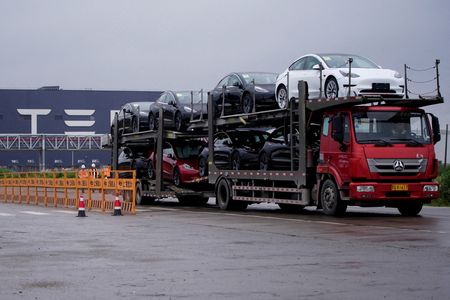 1
1 1
1

SHANGHAI (Reuters) -China’s measures to combat COVID-19 hurt output at its electric vehicle (EV) factories in March, with Tesla Inc’s Shanghai operation making barely more cars than in the traditionally low-production month of February.
EV makers in China produced far fewer cars in total than expected in March, due to the pandemic measures, said Cui Dongshu, secretary general of the China Passenger Car Association, which issued data for the period.
While Tesla’s Shanghai factory delivered 16% more cars in March versus the previous month, its production of 55,462 units was only 154 higher than in February, a shorter month during which workers usually get some time off for the Lunar New Year holiday.
EV makers are selling from inventories to support deliveries, Cui said.
China has imposed strict lockdowns to contain the spread of the highly contagious Omicron variant in several places – including Jilin province and Shanghai, where factories of major automakers and their suppliers are located.
Such measures had disrupted logistics and affected retail sales of cars, the association chief said, adding that automakers were facing “tremendous” pressures in maintaining deliveries.
In January, the Tesla Shanghai factory produced 68,117 vehicles. It suspended production in mid-March for two days due to COVID controls. After briefly resuming, it had to halt work again on March 28 due to Shanghai’s lockdown.
Overall passenger car sales in March in China totalled 1.61 million, down 10.9% from a year earlier, the association said.
Chinese EV maker Nio said on Saturday it had suspended production after the country’s measures to contain the recent epidemic surge had disrupted operations at its suppliers. Shares in Nio slumped 9% on Monday.
EXPORTS FELL
The association’s data also showed that Tesla’s exports of cars made in China tumbled to just 60 units as domestic deliveries more than doubled from February.
Cui said that Tesla usually exported fewer cars at end of each quarter so it could satisfy accumulated local orders.
In normal times the Shanghai factory makes 6,000 Model 3 and 10,000 Model Y cars a week for the Chinese, German and Japanese markets.
Some buyers rushed to place orders ahead of anticipated further price increases after Tesla announced price rises in November and March, citing higher costs of raw materials.
Chinese customers now have to wait five months after ordering a Model 3 and three months for a Model Y, a Tesla sales representative said last week.
(Reporting by Zhang Yan and Brenda Goh; Editing by Christopher Cushing and Bradley Perrett)